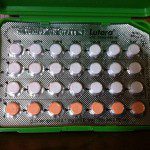![https://commons.wikimedia.org/wiki/File%3APrikpil.JPG; By User:Ciell (Own work) [CC BY-SA 2.5 (http://creativecommons.org/licenses/by-sa/2.5)], via Wikimedia Commons](https://wp-media.patheos.com/blogs/sites/533/2017/02/800px-Prikpil.jpg)
Here’s what Planned Parenthood has to say about the risks and side effects of Depo Provera contraceptive injection:
Some people may get annoying side effects while using the birth control shot, but many of them usually go away after 2 or 3 months. Many people use the shot with no problems at all.
Most women have some change in their periods, including bleeding more days than usual, spotting between periods, or no periods. This is most common during the first year.
Lots of people who use the shot stop getting their period altogether after about a year of using it. This, like all the side effects of the shot, goes away after you stop getting the shot. Your period should go back to normal within a few months after your last shot wears off.
Other possible side effects of the shot include:
nausea
weight gain
headaches
breast tenderness
hair loss or more hair on the face or body
depression
slight bruising where the shot was given
very rarely, a small, permanent dent in the skin where the shot was given
Also:
People who use the birth control shot may have temporary bone thinning. It increases the longer they use the shot. Bone density usually comes back after they stop using the birth control shot except for women who have already reached menopause. To protect your bones, stop smoking, limit your alcohol, and get regular exercise and extra calcium.
There’s a very small chance that you can get pregnant even if you always use the shot correctly. The shot will not increase the risk of birth defects.
Most people using the birth control shot won’t have any problems at all. But just in case, it’s good to know what the signs of a serious issue are.
Tell your doctor or nurse if you have any of the following while using the shot:
severe depression
migraine with aura — bad headache where you see bright, flashing zigzags, usually before a bad headache
pus, pain for many days, or bleeding where you got the shot
very heavy bleeding from your vagina or bleeding for a lot more days than usual
yellowing of the skin or eyes
Here’s what the official prescribing information has to say:
WARNING: LOSS OF BONE MINERAL DENSITY
Women who use Depo-Provera Contraceptive Injection may lose significant bone mineral density. Bone loss is greater with increasing duration of use and may not be completely reversible.
It is unknown if use of Depo-Provera Contraceptive Injection during adolescence or early adulthood, a critical period of bone accretion, will reduce peak bone mass and increase the risk for osteoporotic fracture in later life.
Depo-Provera Contraceptive Injection should not be used as a long-term birth control method (i.e., longer than 2 years) unless other birth control methods are considered inadequate.
This is a “boxed warning” which I understand to be a means of emphasizing the seriousness of the risk.
The prescribing information also quantifies the likelihood of various side effects:
menstrual irregularities (bleeding or spotting) 57% at 12 months, 32% at 24 months, abdominal pain/discomfort 11%, weight gain > 10 lbs at 24 months 38%, dizziness 6%, headache 17%, nervousness 11%, decreased libido 6%.
And an article from August 2016 describes the problems that women face upon discontinuing Depo Provera shots:
Once they stopped taking Depo, many women found that these symptoms intensified and/or they started having new symptoms. The women who commented — from the United States, Canada, United Kingdom, New Zealand, Australia, and Africa — experienced heavy and continuous bleeding, extreme breast tenderness, weight gain, headaches, nausea, extreme mood swings, depression, hair loss, and damaged relationships. Some were frantic about delayed return to fertility, while others, fearful of being pregnant, had taken multiple pregnancy tests.
The short explanation for what they experience is hormonal chaos, an estrogen storm. Dr. Prior explains the endocrinology in the Q&A. Briefly, Depo-Provera suppresses a woman’s own hormones to near menopause levels. Post-Depo, the body works hard to regain reproductive function by overproducing estrogen. Because hypothalamic incoordination delays the return to ovulation, progesterone is not produced to counteract estrogen. Erratic, high, unopposed estrogen causes most of the miserable symptoms.
So what does all this mean? I am not a doctor. I know that it’s difficult to find good information on long-term effects when it’s the users who have bad experiences that publicize them. It’s a bit like reading Amazon reviews for a product: lots of people use it once or twice and rate it well, but, of those who have used it for the long-term, only the disgruntled ones find it worthwhile to write a review. I also certainly don’t know what goes on in a doctor’s office: do doctors inform their patients of the risks?
But it is disturbing to see the “black box” being so thoroughly ignored as to treat “the shot” as just another contraceptive choice among many, and all the side effects that a woman may experience as “worth it” because of the overall benefit to society of preventing an unwanted birth, and because of the presumed greater effectiveness of methods that don’t require daily actions by the user.
Image: https://commons.wikimedia.org/wiki/File%3APrikpil.JPG; By User:Ciell (Own work) [CC BY-SA 2.5 (http://creativecommons.org/licenses/by-sa/2.5)], via Wikimedia Commons











